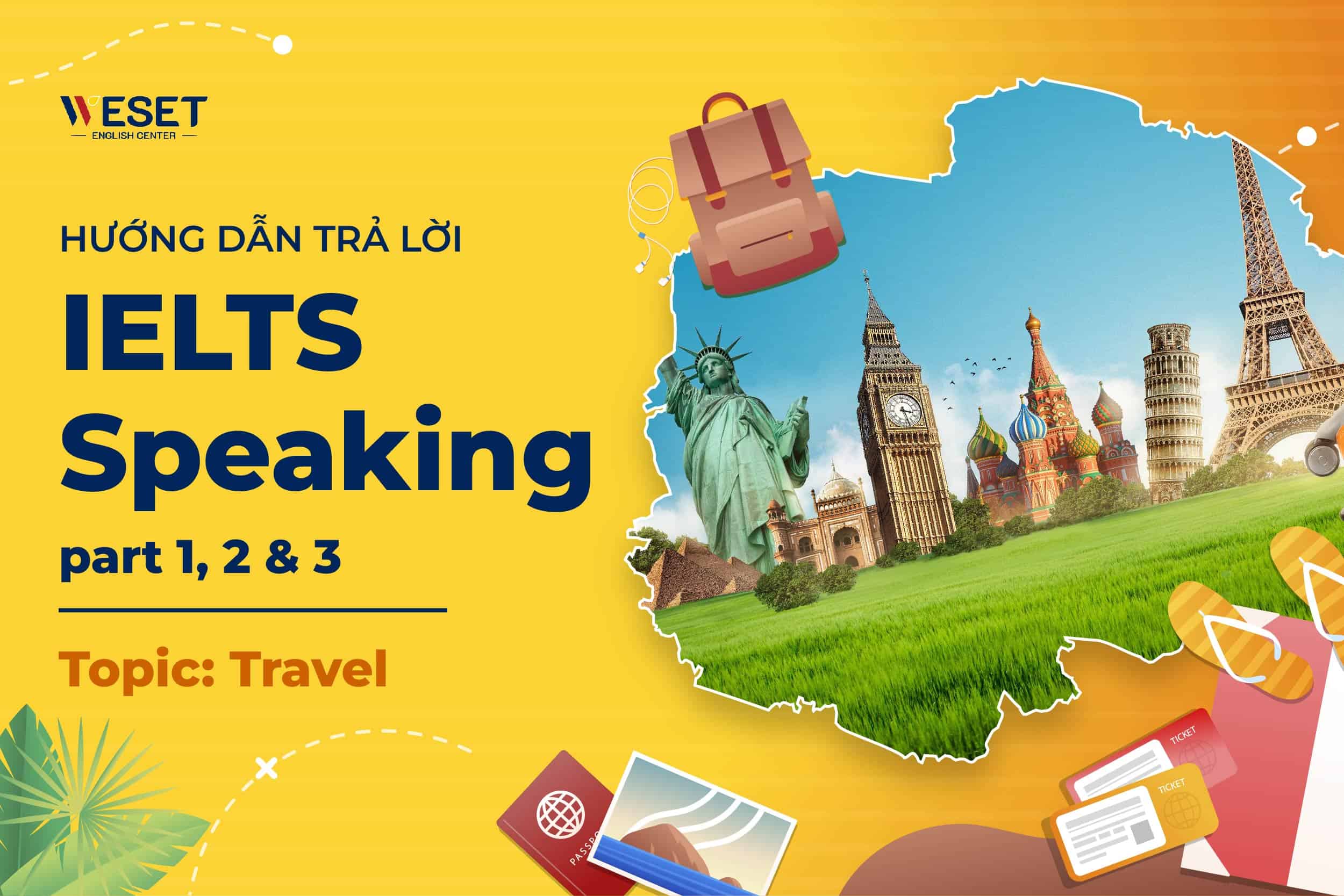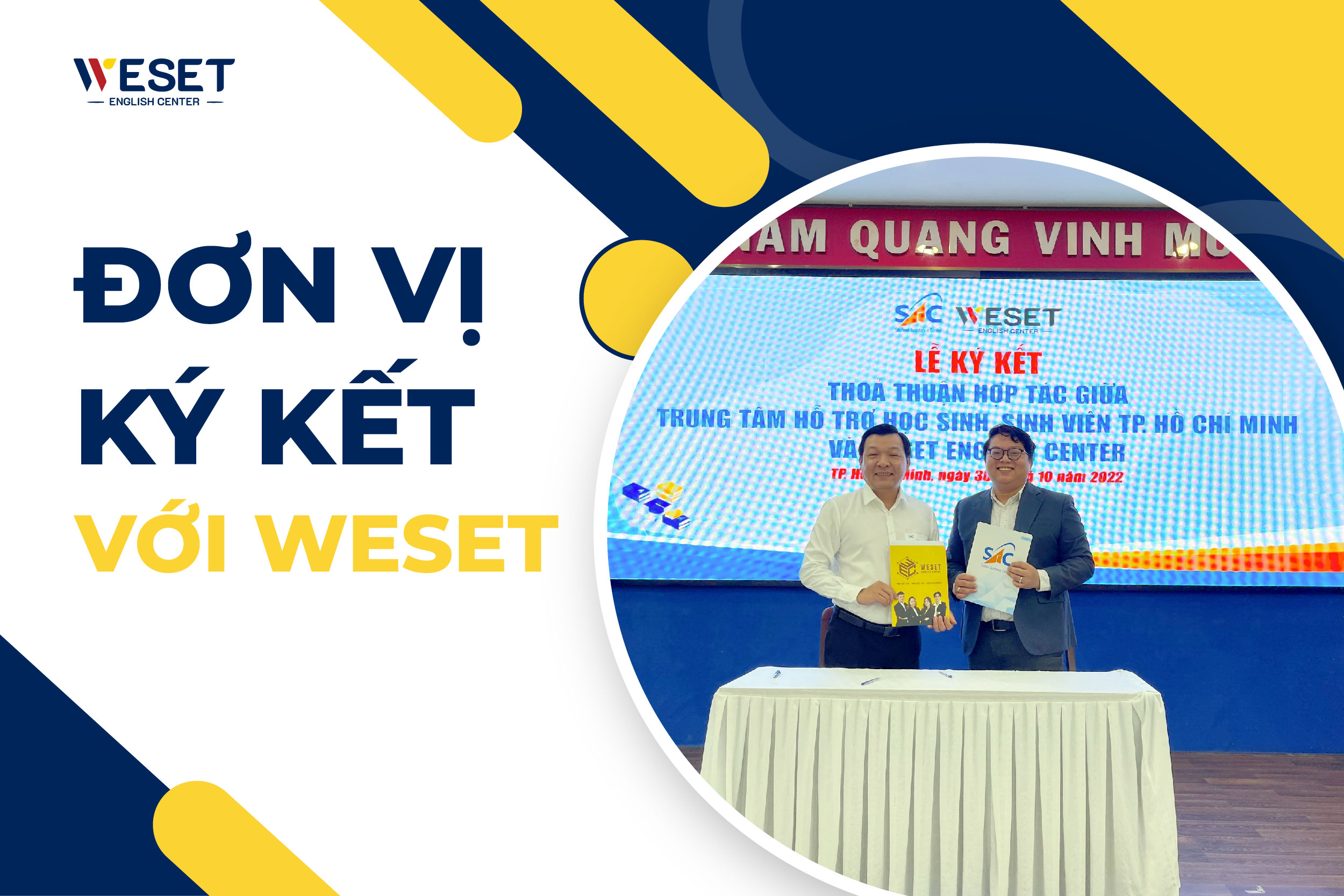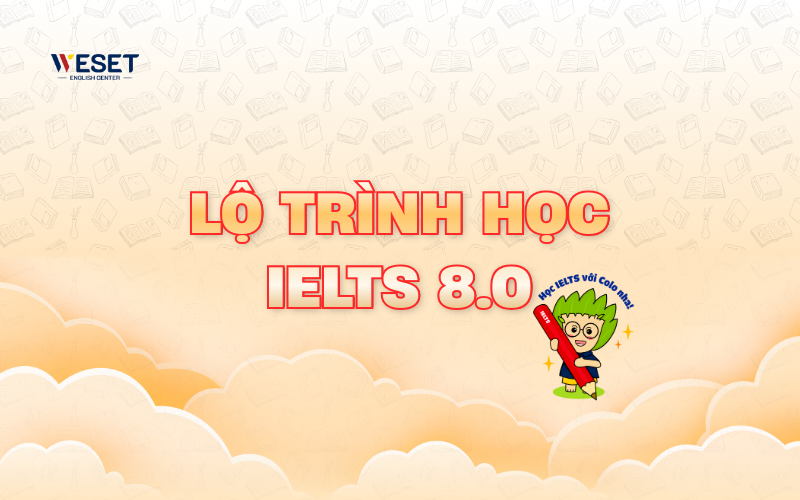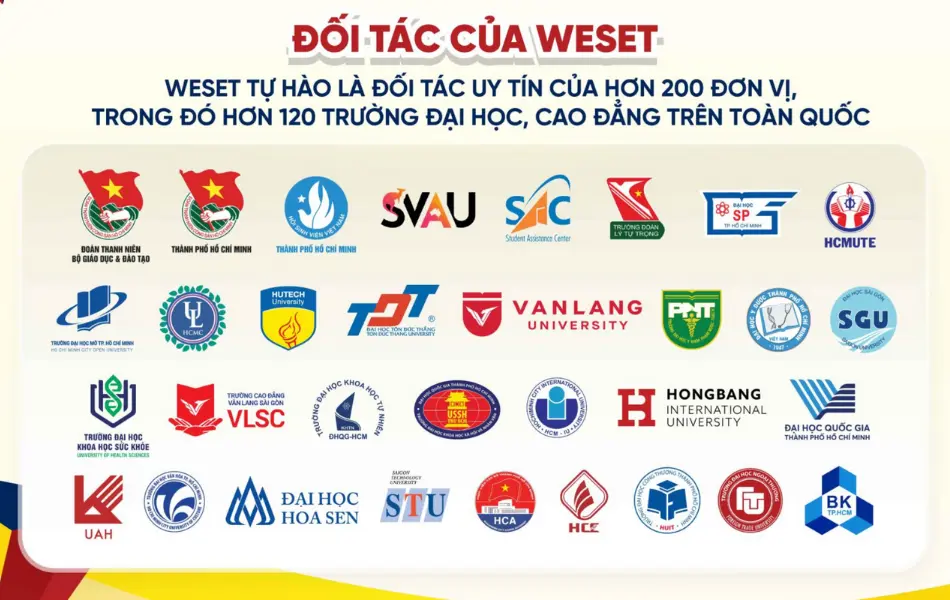Trang chủ Blog Bài thi IELTS mẫu IELTS Speaking Travel – Part 1, 2 & 3 Sample
IELTS Speaking Travel – Part 1, 2 & 3 Sample
- Jonathan M. Pham
- Bài mẫu IELTS Sample Speaking, Bài thi IELTS mẫu
MỤC LỤC
Du lịch (Travel) là một chủ đề khá thú vị và thường được sử dụng trong bài thi nói IELTS. Trong bài viết dưới đây, hãy cùng WESET làm quen với topic này – thông qua một số câu hỏi & câu trả lời IELTS Speaking Travel mẫu, phân loại theo đầy đủ 3 part bạn nhé!
IELTS Speaking Travel – Part 1
Q: Do you enjoy traveling? Why or why not?
A: Yes, I absolutely love traveling. It allows me to explore new places, experience different cultures, and broaden my horizons. I find it fascinating to immerse myself in diverse environments, try new cuisines, and meet people from various backgrounds. Traveling provides a sense of adventure and helps me break out of my routine, which I find refreshing and rejuvenating.
Q: What kind of places have you visited for vacations?
A: I have been fortunate to visit a variety of places for vacations. I have explored bustling cities like New York and Tokyo, where I was captivated by the fast-paced lifestyle and iconic landmarks. I have also traveled to serene natural destinations, such as the Swiss Alps and the Great Barrier Reef, where I could appreciate the breathtaking beauty of nature. Additionally, I have visited historical sites like the Pyramids of Egypt and the Colosseum in Rome, which offered a glimpse into ancient civilizations.
Q: What are the benefits of traveling?
A: Traveling offers numerous benefits. Firstly, it provides an opportunity to learn about different cultures, traditions, and customs, fostering a sense of cultural appreciation and understanding. It also helps in personal growth by exposing individuals to new experiences and challenges that broaden their perspectives. Traveling can enhance one’s adaptability, problem-solving skills, and confidence. Moreover, it offers a break from the daily routine and allows people to relax and rejuvenate, reducing stress and promoting overall well-being.
Q: What factors do you consider when choosing a travel destination?
A: When choosing a travel destination, several factors come into play. Firstly, I consider the climate and weather conditions during the time of my visit. I prefer destinations with pleasant weather that aligns with the activities I want to engage in. Secondly, I consider the cultural and historical significance of the place. I enjoy destinations with rich heritage and iconic landmarks. Additionally, I take into account the safety and security aspects, as it’s essential to feel comfortable during my travels. Lastly, I consider the affordability and accessibility of the destination, including factors like transportation, accommodation, and overall cost.
Q: Would you prefer traveling alone or with others? Why?
A: While both options have their merits, I personally prefer traveling with others. Exploring new places with friends or family enhances the overall experience. It allows for shared memories, laughter, and meaningful conversations. Traveling together also provides a sense of security and companionship, especially when encountering unfamiliar situations. Furthermore, having travel companions opens doors to new perspectives and helps in creating lasting bonds. However, I do appreciate the occasional solo travel experience, as it offers a chance for self-reflection and independence.
IELTS Speaking Travel – Part 2
Q: Describe a memorable travel experience you had. You should say:
- Where and when you travelled
- Who you travelled with
- What you did during your trip, and
- Explain why this travel experience was memorable for you.
A: One of the most memorable travel experiences I had was when I visited the stunning city of Paris in France. It was during the summer of 2019, and I was fortunate to go on this trip with my close friends.
During our trip, we immersed ourselves in the rich culture and beauty that Paris had to offer. We explored famous landmarks such as the Eiffel Tower, the Louvre Museum, and Notre-Dame Cathedral. The architecture and history of these iconic sites left us in awe. We also strolled along the picturesque streets of Montmartre, where we encountered talented street artists and enjoyed the vibrant atmosphere.
One of the highlights of our trip was indulging in the exquisite French cuisine. We savored delicious croissants and pastries at charming local bakeries, and we couldn’t resist trying traditional dishes like escargots and coq au vin. The gastronomic experience was truly remarkable and added to the overall enjoyment of our journey.
What made this travel experience particularly memorable was the strong bond we formed as friends during the trip. We laughed, shared stories, and created lasting memories together. Exploring a foreign city with my friends made every moment more meaningful and enjoyable. We navigated through the city’s winding streets, tackled language barriers, and relied on each other for support. It was a journey of adventure, discovery, and friendship.
Moreover, being in Paris, often referred to as the “City of Love,” added an extra touch of magic to the experience. Witnessing the breathtaking sunset from the top of the Eiffel Tower and taking romantic walks along the Seine River created a sense of romance and wonder that will forever stay etched in my memory.
Overall, this travel experience to Paris was truly unforgettable. The combination of exploring iconic landmarks, indulging in delicious cuisine, forming stronger bonds with my friends, and immersing myself in the romantic ambiance of the city made it a journey I will cherish for a lifetime.
IELTS Speaking Travel – Part 3
Q: What are some benefits of international travel?
A: International travel offers numerous benefits. Firstly, it provides an opportunity to experience different cultures firsthand, fostering cultural appreciation and understanding. It allows individuals to broaden their perspectives and challenge preconceived notions. Secondly, international travel enhances language skills as people interact with locals and navigate through different languages. It also promotes personal growth by encouraging adaptability, resilience, and problem-solving skills. Additionally, international travel opens doors to new experiences, creating lifelong memories and facilitating the development of meaningful connections with people from diverse backgrounds.
Q: Do you think it’s important for young people to travel?
A: Absolutely, I believe it is crucial for young people to travel. Traveling at a young age exposes individuals to new cultures, ideas, and experiences, which contributes to their personal and intellectual growth. It helps them become more open-minded, tolerant, and appreciative of diversity. Furthermore, traveling allows young people to step out of their comfort zones, face challenges, and develop valuable life skills like independence, adaptability, and self-confidence. It broadens their horizons, expands their knowledge, and prepares them for a globalized world.
Q: How has travel become more accessible in recent years?
A: Travel has become increasingly accessible in recent years due to various factors. Firstly, advancements in technology have made it easier to plan and book trips. With the help of online platforms and travel apps, people can compare prices, find accommodation, and book flights with just a few clicks. Secondly, transportation has become more efficient and affordable, with the expansion of low-cost airlines and improved infrastructure in many countries. Additionally, globalization and increased connectivity have made travel information more readily available, allowing people to research destinations and connect with other travelers for recommendations and tips.
Q: What are the environmental impacts of tourism?
A: Tourism can have both positive and negative environmental impacts. On the positive side, it can contribute to the conservation of natural areas and wildlife through initiatives like national parks and wildlife sanctuaries. It can also raise awareness about environmental issues and promote sustainable practices. However, tourism can also lead to negative impacts such as pollution, habitat destruction, and overconsumption of resources. Activities like excessive waste generation, deforestation for infrastructure development, and carbon emissions from transportation contribute to environmental degradation. Therefore, it is crucial to promote sustainable tourism practices that minimize negative impacts and preserve the natural beauty of destinations.
Q: What are the economic benefits of tourism?
A: Tourism brings significant economic benefits to both local communities and countries as a whole. Firstly, it generates employment opportunities in various sectors such as hospitality, transportation, and entertainment. This helps in reducing unemployment rates and improving the overall standard of living. Secondly, tourism contributes to local businesses and stimulates the economy through the spending of tourists on accommodations, dining, shopping, and recreational activities. Additionally, tourism revenue can be invested in infrastructure development, public services, and conservation efforts, benefiting both tourists and local residents alike.
Vocabulary topic IELTS Speaking Travel
| English | Vietnamese |
|---|---|
| Travel | Du lịch |
| Explore | Khám phá |
| Culture | Văn hóa |
| Landmarks | Điểm đến nổi tiếng |
| Cuisine | Ẩm thực |
| Adventure | Cuộc phiêu lưu |
| Break out of | Thoát khỏi |
| Routine | Rập khuôn |
| Refreshing | Sảng khoái |
| Rejuvenating | Tái sinh |
| Destination | Điểm đến |
| Serene | Yên bình |
| Breathtaking | Ngoạn mục |
| Historical sites | Di tích lịch sử |
| Personal growth | Sự phát triển cá nhân |
| Adaptability | Tính thích ứng |
| Problem-solving | Giải quyết vấn đề |
| Security | An ninh |
| Affordability | Khả năng tiếp cận |
| Accessibility | Khả năng tiếp cận |
| Solo travel | Du lịch một mình |
| Companionship | Tình bạn |
| Unfamiliar | Không quen thuộc |
| Indulge | Nuông chiều |
| Gastronomic | Ẩm thực |
| Memories | Kỷ niệm |
| Ambiance | Bầu không khí |
| Foreign | Nước ngoài |
| Bonds | Mối liên kết |
| Enrich | Làm giàu |
| Language skills | Kỹ năng ngôn ngữ |
| Open-minded | Cởi mở |
| Tolerant | Khoan dung |
| Preconceived | Được hình thành trước |
| Notions | Quan điểm |
| Independence | Tự lập |
| Resilience | Kiên cường |
| Globalized | Toàn cầu hóa |
| Accessible | Dễ tiếp cận |
| Infrastructure | Cơ sở hạ tầng |
| Environmental | Môi trường |
| Conservation | Bảo tồn |
| Wildlife | Động vật hoang dã |
| Awareness | Nhận thức |
| Sustainable | Bền vững |
| Pollution | Ô nhiễm |
| Habitat | Môi trường sống |
| Deforestation | Tàn phá rừng |
| Carbon emissions | Khí thải carbon |
| Economic | Kinh tế |
| Employment | Việc làm |
| Standard of living | Mức sống |
| Local businesses | Doanh nghiệp địa phương |
| Revenue | Doanh thu |
| Infrastructure development | Phát triển hạ tầng |
Lời kết
Hy vọng với bộ câu hỏi & câu trả lời mẫu cho topic IELTS Speaking Travel trên đây, bạn đọc sẽ cảm thấy tự tin hơn khi gặp chủ đề thú vị này trong bài thi thực. Đừng quên luyện tập thật nhiều để sẵn sàng đạt điểm cao nhất bạn nhé!
Tham khảo thêm thư viện bài mẫu IELTS của WESET – tổng hợp từ các đề thi Speaking & Writing qua các năm, dựa theo các topic thường được ra nhất!
Sample Speaking theo các chủ đề khác:







